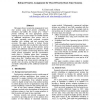Free Online Productivity Tools
i2Speak
i2Symbol
i2OCR
iTex2Img
iWeb2Print
iWeb2Shot
i2Type
iPdf2Split
iPdf2Merge
i2Bopomofo
i2Arabic
i2Style
i2Image
i2PDF
iLatex2Rtf
Sci2ools
120
click to vote
RTSS
2007
IEEE
2007
IEEE
Robust Priority Assignment for Fixed Priority Real-Time Systems
This paper focuses on priority assignment for realtime systems using fixed priority scheduling. It introduces and defines the concept of a “robust” priority ordering: the most appropriate priority ordering to use in a system subject to variable amounts of additional interference from sources such as interrupts, operating system overheads, exception handling, cycle stealing, and task execution time overruns. The paper describes a Robust Priority Assignment algorithm that can find the robust priority ordering for a wide range of fixed priority system models and additional interference functions. Proofs are given for a number of interesting theorems about robust priority assignment, and the circumstances under which a “Deadline minus Jitter” monotonic partial ordering forms part of the robust ordering. The paper shows that “Deadline minus Jitter” monotonic priority ordering is the robust priority ordering for a specific class of system, and that this property holds essentiall...
Related Content
| Added | 04 Jun 2010 |
| Updated | 04 Jun 2010 |
| Type | Conference |
| Year | 2007 |
| Where | RTSS |
| Authors | Robert I. Davis, Alan Burns |
Comments (0)

